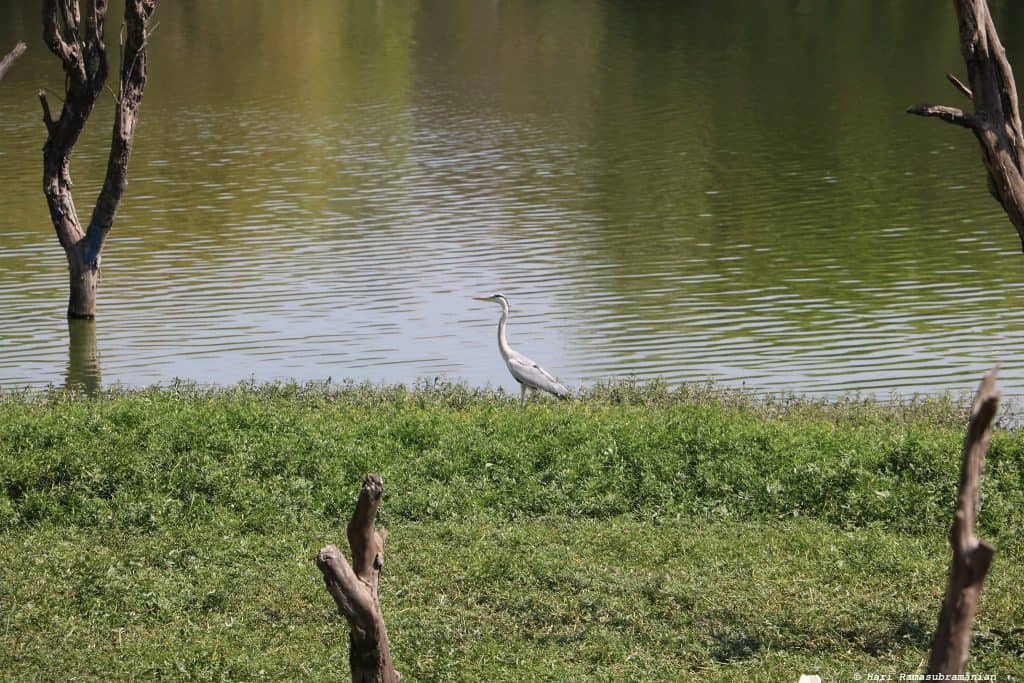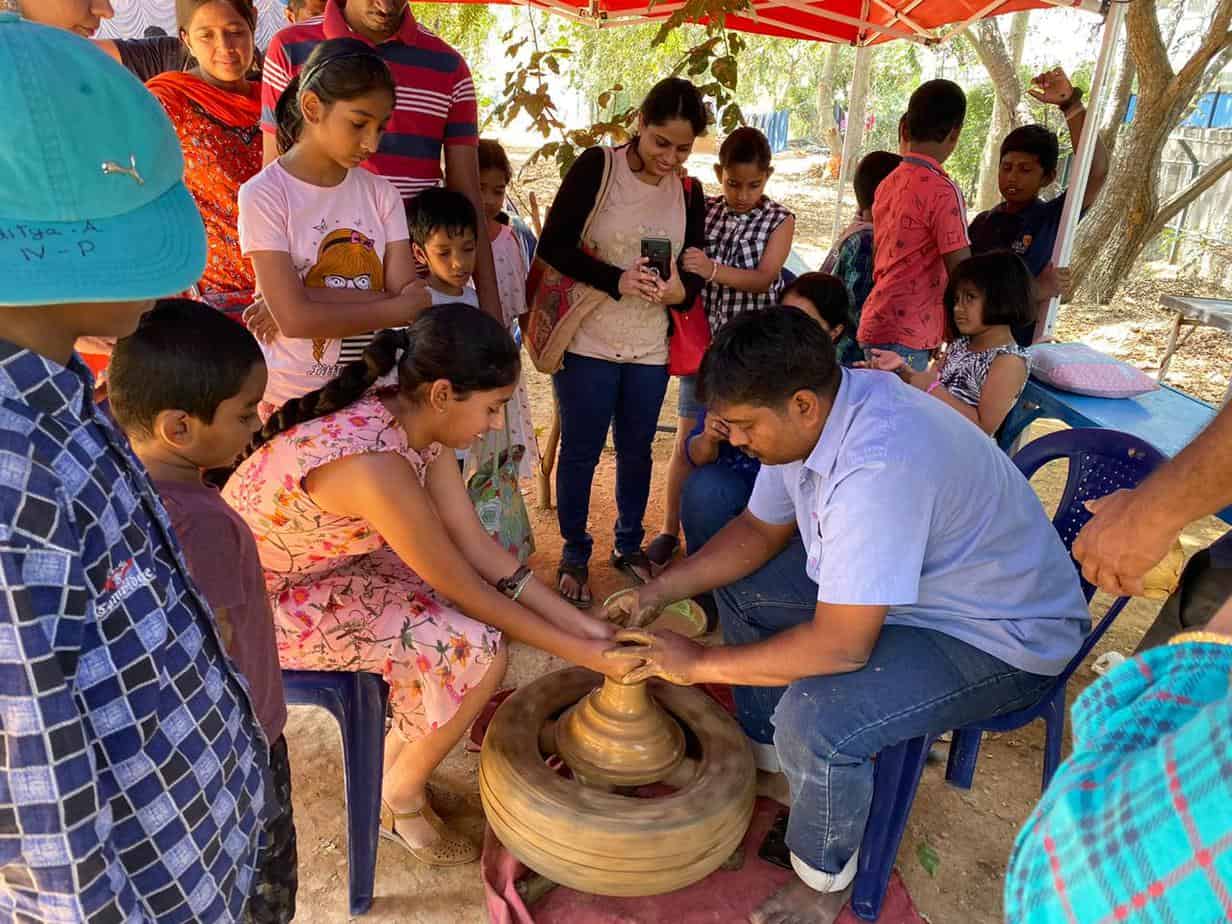Kaikondrahalli Kere Habba entered its 6th edition this year. The Kere Habba has typically been a day long series of events from sunrise to sunset. It celebrates the gorgeous Kaikondrahalli Lake that is spread over 48 acres, 23 guntas on Sarjapur Road. Once a dumpyard, this lake has been a bio-diverse ecosystem for the last few years. The lake’s rejuvenation was taken up by BBMP few years back with the help and efforts of local citizens. The lake has become home to myriad species of resident and migratory birds and other creatures.
To celebrate the lake, this year, a variety of sessions ranging from a 5 km run to traditional art and crafts, for adults and children were hosted – all talking the same idiom of ecology and environment. Overall roughly 2,500 to 3,000 visitors attended the events throughout the day.
The day started with a bird walk sharp at 6 am. The conductor of the walk, Thomas Job, was initially sceptical about the crowd turning up that early, but was pleasantly surprised when 25 people joined in for the bird walk who were an enthusiastic mix of adults, children, both novice and experienced. The bird walk extended 30 minutes beyond the allocated slot. The focus was on identifying the common birds of the lake. The participants spotted 32 species of birds and asked several questions on how to pursue bird watching as a hobby.

The lake is a home to myriad species of resident and migratory birds along with other creatures. Pic: Hari Ramasubramaniam
This was followed by a 5km run on the jogging track around the lake. 150 runners including children from Renuka school and Sneha Care participated in the run. Special eco-friendly medals made of lake reeds were awarded to all registered participants of the run apart from 5 lucky draw prizes. The run was sponsored by NEB Sports and the prizes were sponsored by Play Arena and Four Fountains Spa in form of gift vouchers that were awarded to the runners in person. The run used reusable glasses and water refills at aid stations. The bibs were made of cloth and all registered participants also got a free Kere Habba cloth sling bag. No single-use plastic or paper waste was generated in the run.
Throughout the day here were activities for children at a special kids corner that was set up. Coconut leaf weaving and potter’s wheel were popular among the children. The play arena activities – segway, trampoline and bull ride – were set up next to the amphitheatre. Both young and the elderly enjoyed thoroughly!

Children seen enjoying the pottery making workshop.
Food stalls were open throughout the day and served breakfast, lunch, and evening snacks. Food options were all vegetarian, largely homemade and organic, with local residents and businesses setting up delicious and freshly prepared meals at affordable prices. In addition, there were many local vendors selling local and organic produce, natural cleaners, innovative crafts made of reeds. A mobile library of books was also arranged at the venue.
Well known author, Roopa Pai talked about her new book From Leeches to Slug Glue: 25 Explosive Ideas that Made (and Are Making) Modern Medicine as part of an interactive session titled ‘Thank God for Doctors’. She engaged the audience with various anecdotes and stories about how the advent of modern medicine changed the way diseases were treated.
A photography workshop was organised for enthusiasts to capture the beauty of the lake. Tathaastu, a storytelling performance presenting a series of Boon Stories was performed by Parvathy Eswaran, Meera Venkatesan and Jyothi Kunjoor. Children enjoyed the art and craft workshop where the learnt new painting techniques. A talk on urban ecology was given by Seema Mundoli, co-Author of Cities and Canopies: Trees in Indian Cities.
Seema felt that each year the organisation of the event was getting better. She said,
“It was nice to start on time, have an engaged group and end with a lot of discussion. It was really nice to see people trickling in looking at the lake, catching up with friends, tasting food and participating in the events. A perfect way to spend a Sunday morning. I thoroughly enjoyed myself.”
In the afternoon, there was a storytelling session by Vikram Sridhar and a puppet show for the kids at the amphitheatre that opened to a packed audience. Yakshagana performance by the group Yaksha Sinchini was the grand ending to the Kere Habba holding the audience spellbound for more than 2 hours. The Yakshagana performance had the amphitheatre completely packed and overflowing with people.
The day long event was kept as green and waste free as possible by encouraging visitors to carry their own shopping bags and water bottles (drinking water refills available at the lake). It is a difficult feat to pull off when everyone is so used to single use, disposable plastic and paper, but not an impossible one. All food vendors were instructed to use reusable or compostable cutlery. Since most food stalls got their supply of plates and used plates could be washed in the garden area of the school grounds hosting the habba, the amount of waste generated was only two drums of biodegradable arecanut plate waste. All visitors were informed beforehand through posters and social media announcements to not bring any disposable plastics into the habba.
MAPSAS partnered with a local initiative called Social Cycle to provide rental bicycles to visitors to explore the events spread around the lake. The cycles were available for rentals in within the lake premises for a few hours for zero cost. The children from the neighbourhood had a gala time riding cycles all around the lake while some visitors used the cycles to shuttle between different venues.
This year’s Kere Habba was sponsored by Nilekani Philanthropies and NEB Sports. Other sponsors and partners were Four Fountains Spa, Shahi Export House, Anand Sweets, SuperSeva, Pacific Rim Robotics and PlayArena. The event was organized by the community stakeholder MAPSAS that holds an MoU with BBMP to help maintain the lake with the help of volunteers.
Kere Habba 2020 was supported by many local residents including children who volunteered to help with the organising, issuing food coupons, manning stalls, helping with bicycle rentals, making sure water cans were available and managing trafiic. A big shout out to the traffic police for supporting us the entire day. All in all, the event was a wonderful day spent with family, friends, and the community. There’s nothing better that enjoying the great outdoors at Kaikondrahalli lake.